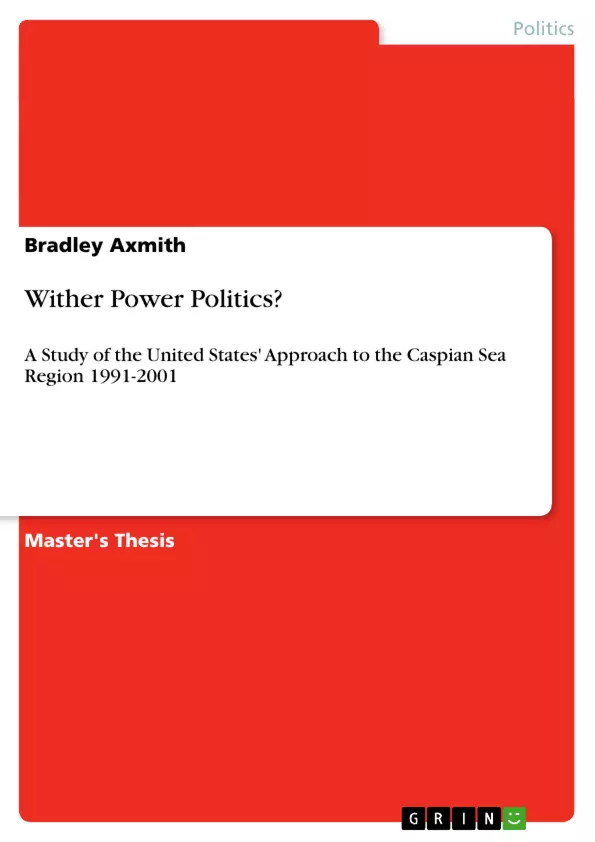
Wither Power Politics?
Masterarbeit, 2009
136 Seiten
Leseprobe
Inhaltsverzeichnis (Table of Contents)
- INTRODUCTION
- OFFENSIVE REALISM
- Bedrock Assumptions
- States' Operational Goals
- Behavioral Models for States Under Anarchic Conditions
- LITERATURE REVIEW
- TIMELINE: 1991-1994
- Introduction
- The Phantom Superpower
- Russia's Southern Belt
- The Democracy Project
- Putting Russia First
- The New Great (Energy) Game
- Pipeline Politics
- US Military Command and the Caspian Sea Region
- Appeasement, Blackmail and Democracy
- Nagorno-Karabakh
- The Tajik Civil War
- TIMELINE: 1995-2001
- Introduction
- NATO and the Security Dilemma
- Toward an Eurasian Corridor
- The Baku-Tbilisi-Ceyhan Pipeline: A Strategic Imperative
- Kazakhstan
- Reshuffling the Caspian Team
- Evidence of Balancing
- Enter China
- CONCLUSION
Zielsetzung und Themenschwerpunkte (Objectives and Key Themes)
This thesis examines the United States' approach to the Caspian Sea Region between 1991 and 2001, with the goal of determining whether its policies adhered to realist principles. By analyzing the historical record through the lens of Offensive Realism, the work investigates the US's pursuit of its security interests in a region marked by energy resources, geopolitical competition, and the emergence of new actors like China.
- The US's approach to the Caspian Sea Region, particularly its pursuit of security interests.
- The role of Offensive Realism in understanding US foreign policy in this context.
- The competition between the US and Russia for influence in the region.
- The potential for China's growing influence to challenge US power.
- The significance of energy resources, particularly oil and gas, in shaping regional dynamics.
Zusammenfassung der Kapitel (Chapter Summaries)
This section will provide summaries of the chapters, focusing on the main themes and arguments without revealing major conclusions.
Chapter 1: Introduction
This chapter introduces the theoretical framework for analyzing the US's approach to the Caspian Sea Region. It discusses the different perspectives on foreign policy, highlighting the importance of understanding the United States' self-perception and its role in the world. It also introduces the concept of American exceptionalism and its impact on US foreign policy.
Chapter 2: Offensive Realism
Chapter 2 delves into the theoretical foundations of Offensive Realism, outlining its key assumptions and principles. It discusses the goals of states in an anarchic international system and how states behave in response to perceived threats and opportunities. The chapter also examines the limitations and challenges of applying Offensive Realism to the US's foreign policy in the Caspian Sea Region.
Chapter 3: Literature Review
This chapter provides a critical review of existing scholarship on the Caspian Sea Region and US foreign policy in the area. It examines different perspectives, analyzes key arguments, and identifies gaps in existing knowledge that the thesis aims to address. It also highlights the methodological and theoretical approaches employed by scholars in this field.
Chapter 4: Timeline: 1991-1994
Chapter 4 begins the in-depth analysis of US policy toward the Caspian Sea Region, focusing on the period immediately following the collapse of the Soviet Union. It explores the US's initial approach to the region, its efforts to promote democracy in Russia, and the emergence of the "New Great Game" for control of energy resources. The chapter examines the role of the US military, the competing interests of Russia, and the challenges posed by internal conflicts in the region.
Chapter 5: Timeline: 1995-2001
This chapter continues the analysis of US policy, focusing on the period from 1995 to 2001. It explores the US's strategies for securing energy resources, including the development of the Baku-Tbilisi-Ceyhan pipeline. The chapter examines the growing role of China in the region, the dynamics of power balancing between the US and Russia, and the challenges posed by regional instability. It also discusses the increasing importance of the US military presence in the Caspian Sea Region.
Schlüsselwörter (Keywords)
The key terms and concepts explored in this thesis include: Offensive Realism, Caspian Sea Region, US foreign policy, energy security, Russia, China, geopolitics, strategic competition, democracy promotion, balance of power, and regional instability.
Details
- Titel
- Wither Power Politics?
- Untertitel
- A Study of the United States' Approach to the Caspian Sea Region 1991-2001
- Veranstaltung
- US Foreign Policy, International Relations in the Caspian Sea Region
- Autor
- Bradley Axmith (Autor:in)
- Erscheinungsjahr
- 2009
- Seiten
- 136
- Katalognummer
- V206231
- ISBN (eBook)
- 9783656343165
- ISBN (Buch)
- 9783656343455
- Dateigröße
- 2136 KB
- Sprache
- Englisch
- Schlagworte
- Caspian Sea energy security foreign policy geopolitics realism
- Produktsicherheit
- GRIN Publishing GmbH
- Preis (Ebook)
- US$ 47,99
- Preis (Book)
- US$ 57,99
- Arbeit zitieren
- Bradley Axmith (Autor:in), 2009, Wither Power Politics?, München, Page::Imprint:: GRINVerlagOHG, https://www.diplomarbeiten24.de/document/206231
- Autor werden
- Ihre Optionen
- Vertriebskanäle
- Premium Services
- Autorenprofil
- Textarten und Formate
- Services für Verlage, Hochschulen, Unternehmen

- © GRIN Publishing GmbH.
- Alle Inhalte urheberrechtlich geschützt. Kopieren und verbreiten untersagt.
- info@grin.com
- AGB
- Open Publishing
Der GRIN Verlag hat sich seit 1998 auf die Veröffentlichung akademischer eBooks und Bücher spezialisiert. Der GRIN Verlag steht damit als erstes Unternehmen für User Generated Quality Content. Die Verlagsseiten GRIN.com, Hausarbeiten.de und Diplomarbeiten24 bieten für Hochschullehrer, Absolventen und Studenten die ideale Plattform, wissenschaftliche Texte wie Hausarbeiten, Referate, Bachelorarbeiten, Masterarbeiten, Diplomarbeiten, Dissertationen und wissenschaftliche Aufsätze einem breiten Publikum zu präsentieren.
Kostenfreie Veröffentlichung: Hausarbeit, Bachelorarbeit, Diplomarbeit, Dissertation, Masterarbeit, Interpretation oder Referat jetzt veröffentlichen!
- GRIN Verlag GmbH
-
- Nymphenburger Str. 86
- 80636
- Munich, Deutschland
- +49 89-550559-0
- +49 89-550559-10
- info@grin.com
-









